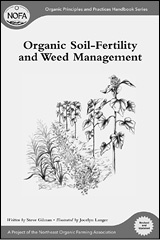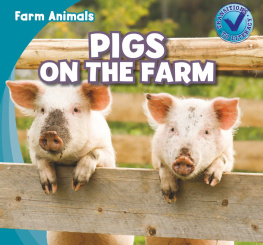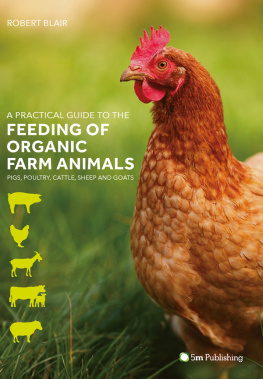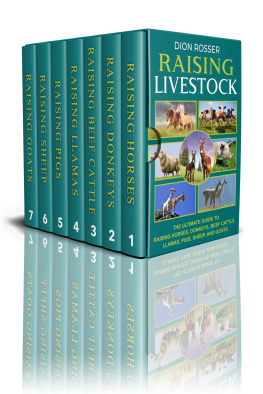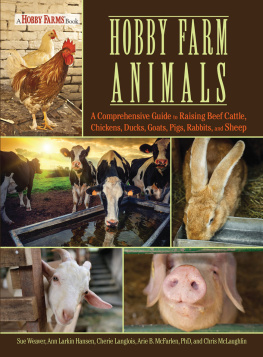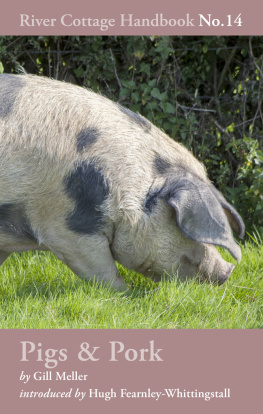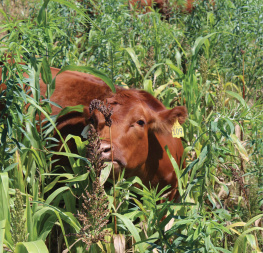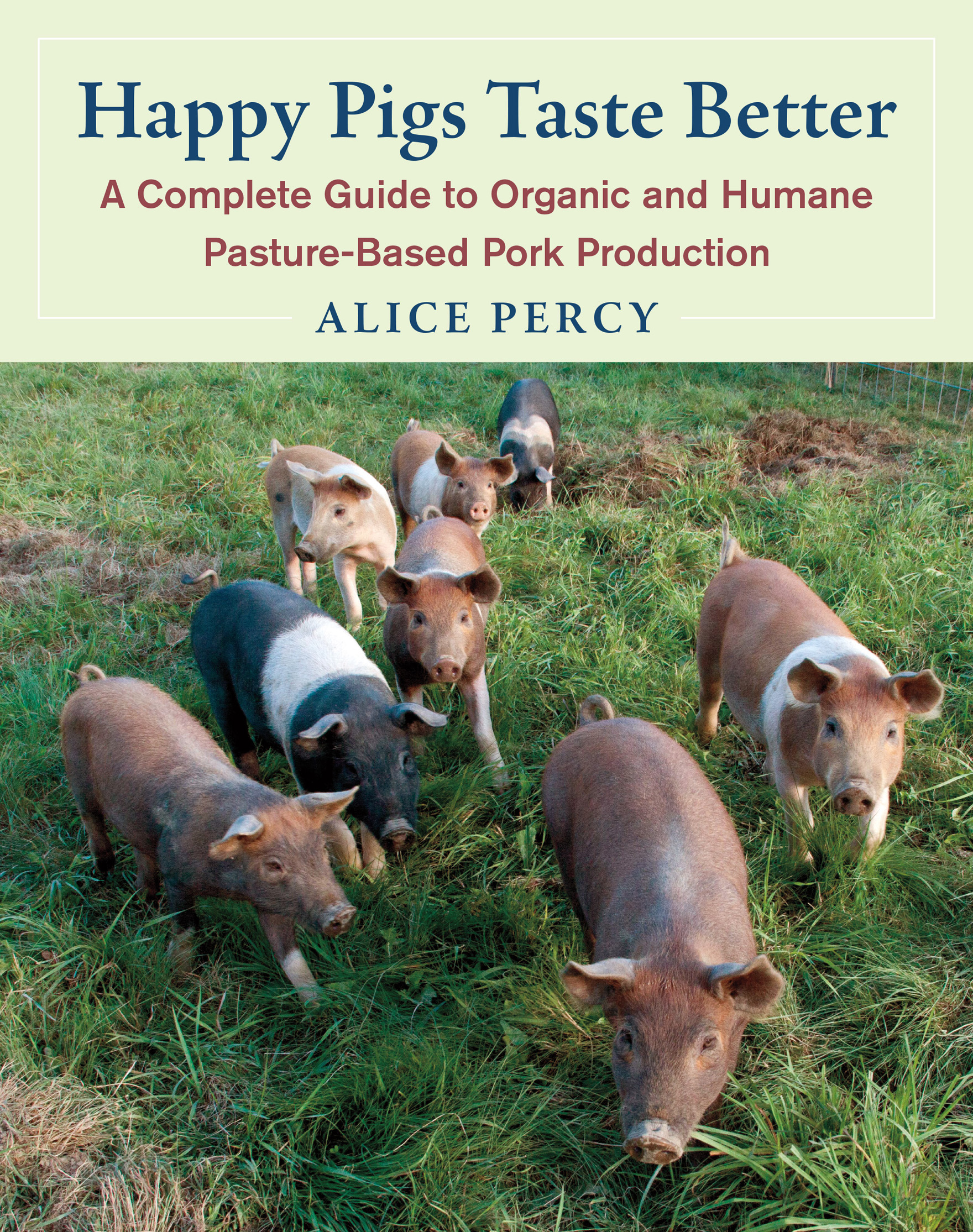Contents
Guide
Pagebreaks of the print version
Praise for Happy Pigs Taste Better
Searching for a thorough, research-backed book on pasture-raising pigs and the business of selling pork? Then look no further because Alice Percy has produced the most comprehensive guide on the subject to date. Covering all the basics, with special attention to the unique behavior of swine and the importance of preventative practices to keep them in optimal health, farmers will be able to produce healthier animals and tastier pork if they follow her advice.
Rebecca Thistlethwaite, author of
The New Livestock Farmer and Farms with a Future
At Rodale Institute we believe we can humanely raise animals, out on pasture, in a way that supports both soil health and the farmers bottom line. Alice Percys Happy Pigs Taste Better is the book I wish Id had when I first started raising pastured, organic pigs. Its an excellent resource for getting started, or advancing and improving your operation.
Shelby Dukes, animal husbandry specialist, Rodale Institute
Theres a wealth of helpful information in this beautifully produced handbook which should get first-time, small-scale pig producers off to a great start. Alice Percy makes it abundantly clear that keeping pigs on pasture has huge welfare benefits, but also that they are not ruminants and need high-quality supplemental feed in order to thrive. While most of the information is relevant wherever you are in the world, readers should check their domestic regulations, as what may be legal in the United States (for example nose ringing and castration) may not be permitted in other countries. In the EU, conversely, antibiotics may be used if required to prevent poor welfare. Even experienced pig keepers will find tips of interest in the rearing of that wonderful species, the pig!
Helen Browning, chief executive, Soil Association (UK)
More than simply a gastronomic argument for humane pork production, this volume will inspire the reader to contemplate that next step: rearing pigs. Even if, for whatever reason, one feels unable to take on that responsibility, this book will leave the reader with an enriched understanding of a pigs life and a concomitant sense of injustice at their commodification and suffering at the hands of mass producers.
Jamie Berger, restaurateur and cofounder, Pitt Cue (London)
Having known Alice Percy for nearly twenty years, I can say with conviction that the welfare of the pigs is her first priority on a farm or homestead. Alice has always been very thorough in her research on the science behind the methods and materials she uses in raising pigs. By including information on the economics necessary for the success of the farm, she also considers the welfare of the farm and the farmer.
Diane Schivera, organic livestock specialist,
Maine Organic Farmers and Gardeners Association
Happy Pigs Taste Better
A Complete Guide to Organic and Humane Pasture-Based Pork Production
ALICE PERCY
Chelsea Green Publishing
White River Junction, Vermont
London, UK
Copyright 2019 by Alice Percy.
All rights reserved.
No part of this book may be transmitted or reproduced in any form by any means without permission in writing from the publisher.
Project Manager: Sarah Kovach
Acquisitions Editor: Ben Watson
Developmental Editor: Nick Kaye
Copy Editor: Eileen M. Clawson
Proofreader: Laura Jorstad
Indexer: Linda Hallinger
Designer: Melissa Jacobson
Page Composition: Abrah Griggs
Printed in Canada.
First printing May 2019.
10 9 8 7 6 5 4 3 2 1 19 20 21 22 23
Our Commitment to Green Publishing
Chelsea Green sees publishing as a tool for cultural change and ecological stewardship. We strive to align our book manufacturing practices with our editorial mission and to reduce the impact of our business enterprise in the environment. We print our books and catalogs on chlorine-free recycled paper, using vegetable-based inks whenever possible. This book may cost slightly more because it was printed on paper that contains recycled fiber, and we hope youll agree that its worth it. Happy Pigs Taste Better was printed on paper supplied by Marquis that contains 100% postconsumer recycled fiber.
Library of Congress Cataloging-in-Publication Data
Names: Percy, Alice, author.
Title: Happy pigs taste better : a complete guide to organic and humane
pasture-based pork production / Alice Percy.
Description: White River Junction, Vermont : Chelsea Green Publishing, [2019] | Includes bibliographical references and index.
Identifiers: LCCN 2019002797| ISBN 9781603587914 (paperback) | ISBN 9781603587921 (ebook)
Subjects: LCSH: Swine. | Swine industry. | Organic farming.
Classification: LCC SF395 .P38 2019 | DDC 338.1/764dc23
LC record available at https://lccn.loc.gov/2019002797
Chelsea Green Publishing
85 North Main Street, Suite 120
White River Junction, VT 05001
(802) 295-6300
www.chelseagreen.com
To Rufus Percy, who farmed with me for eleven years. We couldnt have done it without your versatility, mechanical skills, patience, and abundant energy. That was a hell of a ride, and we really do have a lot to show for it.
To Calvin, Lowell, and Silas Percy, who put up with their mother spending way more time on the screen than they are ever allowed to have while she wrote this book. Youre the best litter of piglets ever.
To Kristin Dillon, for her unflagging support, enthusiasm, and documentation.
To Ben Watson, my editor, for being remarkably chill and eternally helpful during this process.
To the pigs!
Contents
INTRODUCTION
Why Happy Pigs?
CHAPTER 1
Designing from the Ground Up
CHAPTER 2
Holistic Hogs
CHAPTER 3
Housing: From Woods to Barn
CHAPTER 4
Fencing and Pasture Systems
CHAPTER 5
Feeding for Quality and Profit
CHAPTER 6
Hog Health Care:
The Natural and Effective Way
CHAPTER 7
Midwifery for the Swineherd
CHAPTER 8
From Nose to Tail: Understanding Hog Butchery
CHAPTER 9
Pigs and Piggy Banks: Managing and Marketing Your Business
CONCLUSION
So You Want to Be a Pig Farmer?
Pigs and humans have been together for a long timewell over ten thousand years! The history of the two species likely first joined in southwestern Turkey, though new evidence based on DNA sequencing suggests that wild boars may have been domesticated independently in thirteen other regions, ranging from central Europe to the Indian subcontinent to central China and Oceania. In the millennia that followed, domesticated swine spread to practically every corner of the globe. Christopher Columbus brought pigs to Cuba, while Hernando de Soto brought them to the North American mainland. They arrived in Australia with the First Fleet in 1788 and in New Zealand with whalers in the early nineteenth century. All around the world, pigs hardiness, versatility, and tastiness have made them desirable companions for humans.
In North America the pig quickly naturalized in southern regions and was brought west by European colonists traveling from the eastern seaboard. For pioneers on the move or living in crude conditions, pigs were easier to care for than sheep or cattle and provided a valuable source of cooking fat. Their appeal to settlers was further enhanced by the fact that their meat could be easily preserved by salting or brining before the invention of refrigeration.


